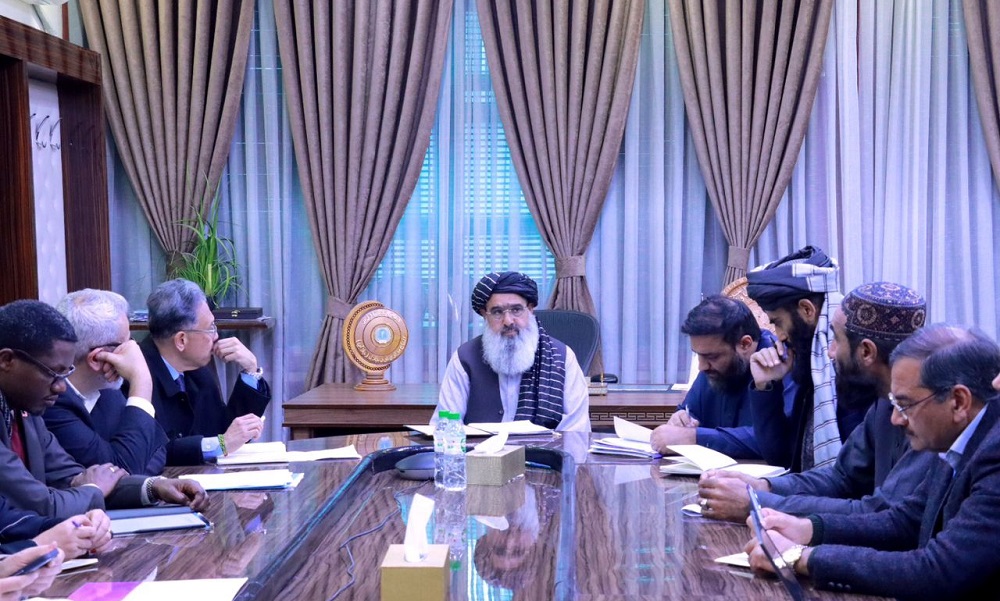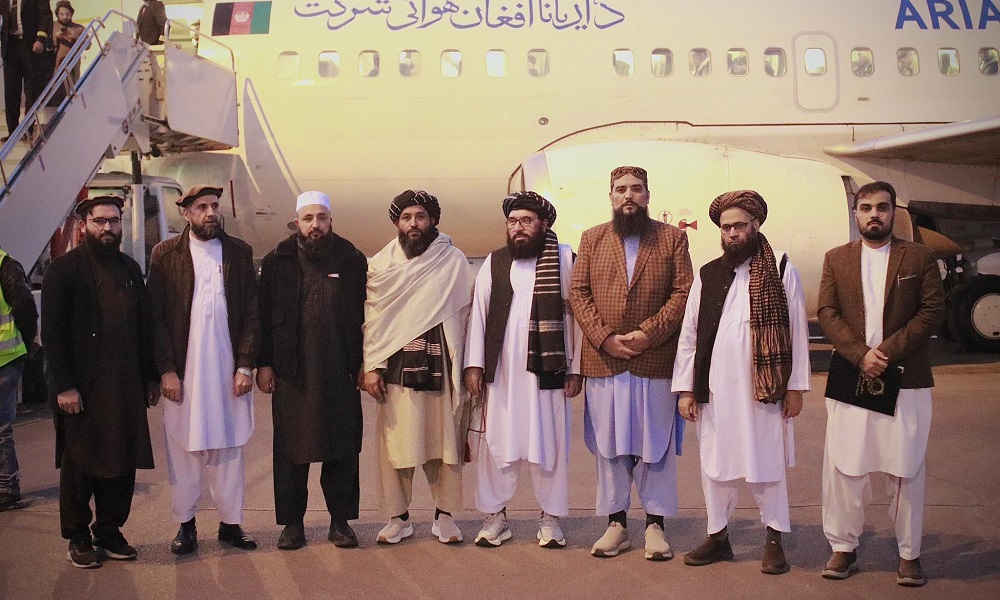Health
WHO’s chief calls for ‘engagement’ to prevent collapse of health sector

World Health Organization Director General Tedros Adhanom Ghebreyesus said on Thursday that the health system in Afghanistan is on the brink of collapse and called on the international community to engage with the new rulers, the Islamic Emirate of Afghanistan (IEA).
Giving a report back following his visit to Kabul this week, Ghebreyesus said: “In Afghanistan, we met with senior members of the Taliban (IEA) leadership, including the interim Prime Minister Mullah Mohammad Hasan Akhund. I believe that engaging the Taliban (IEA) leadership is essential if we are to support the people of Afghanistan.”
Ghebreyesus said that the health system in Afghanistan is on the brink of collapse.
“Over the past 20 years, significant health gains have been made in Afghanistan, in reducing maternal and child mortality, to end polio, and more. Those gains are now at severe risk, with the country’s health system on the brink of collapse,” he said.
According to him, almost 50% of children in Afghanistan are at risk of malnutrition and the country is facing an imminent humanitarian catastrophe unless urgent action is taken.
“There has been a surge in cases of measles and diarrhea; almost 50% of children are at risk of malnutrition; a resurgence of polio is a major risk; and 2.1 million doses of COVID19 vaccine remain unused,” Ghebreyesus said.
Ghebreyesus also raised his concern over the exodus of health workers from the country.
“Health workers are leaving, creating a brain drain that will have consequences for years to come,” said Ghebreyesus adding that “We visited a hospital where I met some nurses who have stayed. My heart broke when they told me they have not been paid in three months, but they said they would continue to serve their patients.”
Ghebreyesus also said that education is essential for protecting and promoting health in all countries, both in terms of health literacy, and for building the health workforce.
“The Taliban (IEA) leadership has announced that primary schools are open for boys and girls, and that they are preparing to open high schools to girls. In our discussions we offered to support that process, in partnership with other UN agencies,” Ghebreyesus said.
Ghebreyesus stated that at the moment the WHO’s priority is to support and sustain the health system in Afghanistan.
“The focus of our efforts now is to support and sustain the Sehatmandi project, which is the backbone of Afghanistan’s health system, providing care for millions of people through 2,300 health facilities, including in remote areas,” Ghebreyesus said.
He called on international donors to rapidly re-commit to finance the health system in Afghanistan and said the current pause in funding has resulted in only 17% of these facilities being fully functional at the moment.
He also said two thirds of all health facilities are out of stock of essential medicines.
“As a stop-gap measure, the UNCERF and the GlobalFund are financing WHO and our partners to ensure continuity of health services for the next three months. But this is simply not enough.
“WHO is calling on international donors to rapidly re-commit to finance Sehatmandi, as they have done for almost two decades. We simply can’t abruptly halt support for life-saving health services for millions of Afghans at a time when they’re most vulnerable,” he said.
Ghebreyesus also announced that WHO has now shipped more than 170 metric tons of medical supplies to Afghanistan in the past few weeks.
“We also need a reliable supply chain to be established urgently. WHO was the first agency to airlift essential medicines and supplies into Afghanistan, and we have now shipped more than 170 metric tons of medical supplies,” he said.
Afghanistan is now faced with a medicine shortage crisis due to disrupted border crossings and limited operation of banks along with the stoppage of foreign transactions.
Almost all medicine in Afghanistan is imported from neighboring countries, such as Pakistan, India, Bangladesh, Iran and Turkey.
However, the border crossings between Afghanistan and its neighbors were disrupted in the lead-up to the Islamic Emirate of Afghanistan’s (IEA) takeover, and normal operations are yet to resume.
Health
Health ministry holds meeting with envoys of international organizations in Kabul

Noor Jalal Jalali, Minister of Public Health of Afghanistan, held a meeting in Kabul with representatives of the World Health Organization, UNICEF, the World Bank, the Asian Development Bank, the European Union, the UK Foreign, Commonwealth and Development Office (FCDO), and other international organizations.
According to the ministry’s statement, representatives of these international organizations discussed the delivery of health and development services, improving the management of aid and resources in the health sector, integrating health facilities and aligning them with the new policy, providing health services in accordance with the Ministry of Public Health’s policy, strengthening the immunization and vaccination sector, delivering services based on priorities, and ensuring sustained coordination.
During the meeting, Jalali stressed the need for transparency and attention to the ministry’s priorities in order to enhance the effectiveness and impact of health services. He added that the delivery of health services must be carried out in line with the ministry’s policy and through better management of existing international assistance.
Referring to vaccination campaigns, he stated that the recent measles and polio vaccination campaign had been implemented very successfully, and emphasized that necessary preparations should be made for upcoming campaigns.
He also provided information regarding the review of the BPHS and EPHS health packages and the establishment of a standardized system through technical committees.
In this meeting, Edwin Ceniza, the WHO Representative for Afghanistan, reaffirmed the organization’s continued cooperation with the Ministry of Public Health and expressed appreciation to the ministry’s leadership for their tireless efforts to improve the health system.
Representatives of these organizations pledged to maintain effective and sustained coordination and to provide their services within the country in accordance with the policies and principles of the Ministry of Public Health.
Health
IEA health delegation travels to Turkey

Abdul Wali Haqqani, Deputy Minister for Health Services at the Ministry of Public Health of the Islamic Emirate of Afghanistan (IEA), has departed for Turkey on an official visit accompanied by a high-ranking delegation.
According to a statement released by the Health Ministry on Wednesday, the trip aims to acquire new health-sector expertise, assess Turkish medical and scientific institutions, meet with Turkish health and government officials, and strengthen bilateral cooperation.
During the visit, the delegation is scheduled to meet representatives from both public and private health sectors to support improvements in Afghanistan’s healthcare system and enhance coordination between the two countries, the statement added.
Health
Polio vaccination drive launches across 17 Afghan provinces
Officials say routine vaccination remains the most effective tool for eliminating polio and have urged families to fully cooperate with health teams during the campaign.

The Ministry of Public Health has announced the launch of a major anti-polio vaccination campaign, set to begin on Monday across 17 provinces of Afghanistan.
According to Sharafat Zaman, spokesperson for the ministry, the nationwide initiative will target 7.4 million children under the age of five, delivering vaccines door-to-door to prevent the spread of the poliovirus and safeguard children’s health.
Officials say routine vaccination remains the most effective tool for eliminating polio and have urged families to fully cooperate with health teams during the campaign.
This effort forms part of the government’s ongoing strategy to protect Afghanistan’s next generation from preventable diseases and strengthen public health across the country.
This comes after the World Health Organization (WHO) recently again classified the global spread of poliovirus as a Public Health Emergency of International Concern (PHEIC), warning that the disease remains endemic in only two countries — Afghanistan and Pakistan.
The decision followed the 43rd meeting of the Polio Emergency Committee under the International Health Regulations (IHR), which convened on 1 October 2025.
According to the Committee, Afghanistan reported four new wild poliovirus type 1 (WPV1) cases so far this year, compared to 24 in Pakistan.
The Afghan cases were detected in the country’s southern and eastern regions, where transmission remains intense despite ongoing vaccination efforts.
-

 Sport4 days ago
Sport4 days agoILT20: Desert Vipers edge Gulf Giants in historic super over thriller
-

 Latest News2 days ago
Latest News2 days agoMuttaqi: Afghanistan’s progress requires both religious and modern education
-

 Regional4 days ago
Regional4 days agoSix Pakistani soldiers killed in TTP attack in Kurram District
-

 Business4 days ago
Business4 days agoTrade bodies warn almost 11,000 Afghan transit containers stuck at Karachi port
-

 World4 days ago
World4 days agoPowerful 7.6 earthquake hits northern Japan, tsunami warnings issued
-

 Latest News3 days ago
Latest News3 days agoTrump calls Afghanistan a ‘hellhole’ country as US expands immigration restrictions
-

 Sport5 days ago
Sport5 days agoSorkh Poshan Khafi defeats Sarsabz Yashlar 4-0 in Afghanistan Champions League
-

 Sport3 days ago
Sport3 days agoCommanding wins for Arman FC and Sarsabz Yashlar in Afghanistan Champions League
























